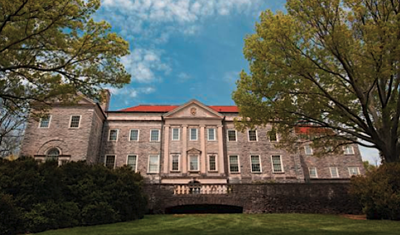This story is a partnership between the Nashville Banner and the Nashville Scene. The Nashville Banner is a nonprofit, nonpartisan news organization focused on civic news. Visit nashvillebanner.com for more information.
With a lawsuit brewing involving Cheekwood Estate and Gardens and its Swan Ball committee, questions are arising as to whether the annual event will be held in 2025.
Cheekwood officials said Tuesday that the event will not take place. However, Swan Ball volunteers — who initiated the legal action in an effort to maintain their control of the gala — note they are moving forward with next year's event.
Charity gala committee contends leaders of nonprofit cultural attraction planned 'coup' to take control of event
“Cheekwood will vigorously defend its ownership of the Swan Ball and ensure that it meets nationally recognized benchmarks and best practices for philanthropic fundraising and expense ratios,” the Cheekwood board of trustees said in a statement. “However, due to the current litigation initiated by this new entity, Cheekwood has no choice but to postpone and cease all planning for the 2025 Swan Ball until this matter is resolved.”
In response, Jana Davis, a Swan Ball board member who chaired the event in 2019 and is among the volunteer board members suing Cheekwood, says that plans for 2025 are ongoing.
“Plans are already underway for our ball — for 2025, our Swan Ball,” Davis says. “And we look forward to working with a grateful beneficiary.”
Cheekwood called for Davis’ group to cease and desist.
A lawsuit filed in U.S. District Court on Tuesday on behalf of Davis’ group, which is a newly registered nonprofit, alleged that Cheekwood Botanical Gardens orchestrated a “coup” over the past year to take over operations of the annual ball. The suit argued that the volunteer board that organizes the Swan Ball, which acts as a charity event for Cheekwood, has historically been independent of the botanical gardens.
“Cheekwood has deep respect for the hundreds of volunteers who annually work in partnership with us to make the Swan Ball so magical,” reads Cheekwood’s statement. “Therefore, we were shocked and saddened to learn that, as a result of Cheekwood’s requests for stronger fiscal responsibility, an anonymous group of Swan Ball volunteers formed a new legal entity that filed a federal lawsuit to separate the Swan Ball from Cheekwood.”
The dispute results from a push by Cheekwood over the past couple of years to bring the Swan Ball’s ratio of expenses to dollars donated more in line with industry standards. While the volunteer board remains reluctant to cut back on costs, an email from Maia Woodhouse, Cheekwood’s lawyer and an attorney with Adams and Reese, to the Swan Ball volunteer board’s lawyer argued that the “increasingly extravagant and expensive” Swan Ball’s fundraising efficiency ratio falls far below the standard set by galas held by other large nonprofits across the country.
Cheekwood officials note the 2023 Swan Ball fundraising efficiency ratio was 36 percent (in short, the event generated only 36 percent more than the amount spent to hold the gala), with a goal of at least 60 percent being ideal. For comparison, various national events — including the Met Gala, the San Francisco Ballet Gala and the American Museum of Natural History Gala "consistently meet — and exceed — the 60 to 70 percent industry standards."
“The Swan Ball’s fundraising efficiency ratio now falls well under the 60-70 percent industry standard,” Woodhouse wrote. “Last year, for example, the fundraising efficiency ratio of the Swan Ball was only 36 percent. The year prior netted an even lower 26 percent.”
An audit of Cheekwood shows that in 2022, the event brought in more than $2.4 million in contributions and revenues but had more than $1.6 million in fundraising expenses, leaving $800,000 for the nonprofit. Meanwhile, in 2021, the ball was canceled because of COVID-19, and the event brought in more than $1.4 million in contributions and revenues. However, it only had around $265,000 worth of fundraising expenses, which meant Cheekwood got $1.2 million out of it.
Meanwhile, according to a chart in Woodhouse’s email, nonprofit organizations nationwide get much higher returns on their fundraising events. The Nashville Symphony, for example, has a 66 percent fundraising efficiency ratio.
Davis argued that Cheekwood leadership doesn’t understand how inherently expensive it is to put on the event.
“It costs $600,000 just to erect that tent and pay for our Swan Ball staff, which is a big chunk, and that’s not decoration, chandeliers, flowers, nothing,” Davis said. “It’s just getting that tent up and getting it stable, because it’s on very rough ground.”
Similarly, Chanelle Acheson, a Waddey Acheson attorney representing Davis and the other plaintiffs, previously said the issue is about to the ownership of the trademark — which is disputed — and not the fundraising efficiency ratio.
"This is a dispute about property," Acheson says, adding the trademark ownership is what is at issue.
Cheekwood and Davis’ group referenced ongoing conversations between Cheekwood and the Swan Ball volunteer board over how to decrease expenses. According to Woodhouse’s email, those conversations were a falsity.
“Resistant to reform and modernization and determined to continue the trend of lavish spending and charitable underperformance, your clients pretended to engage with Cheekwood while secretly conspiring to seize ownership and control of the Swan Ball,” Woodhouse wrote.
This the Scene's sister publication, the Nashville Post, contributed to this report.






